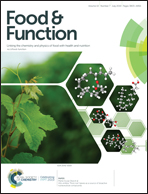Cinnamon subcritical water extract attenuates intestinal inflammation and enhances intestinal tight junction in a Caco-2 and RAW264.7 co-culture model†
Abstract
Cinnamon is known to have several physiological effects; the effects of Cinnamomum japonicum Sieb. on anti-inflammation and tight junctions were investigated in the cellular intestinal inflammation model. Cinnamon subcritical water extract (CSWE) significantly down-regulated the protein and expression levels of nitrite, prostaglandin E2 (PGE2), interleukin (IL)-6, IL-8, tumor necrosis factor (TNF)-α, nuclear factor kappa B (NF-κB) activity, and the phosphorylation of the factors of the NF-κB pathway. It also significantly decreased the permeability but increased the transepithelial electrical resistance (TEER) value and the protein and expression levels of tight junction proteins (i.e., zonula occludens (ZO)-1, occludin, and claudin-1). Furthermore, cinnamic acid and cinnamaldehyde, the major components of C. japonicum, inhibited the phosphorylation of the NF-κB pathway and increased the tight junction protein expression. CSWE from C. japonicum may improve intestinal health by enhancing tight junctions and inhibiting inflammation of the intestines.



 Please wait while we load your content...
Please wait while we load your content...